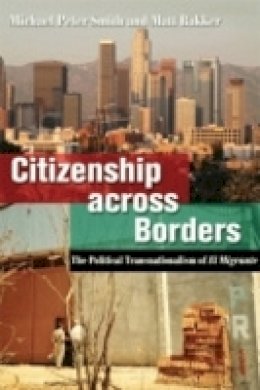
Citizenship across Borders: The Political Transnationalism of El Migrante
Michael Peter Smith
Michael Peter Smith and Matt Bakker spent five years carrying out ethnographic field research in multiple communities in the Mexican states of Zacatecas and Guanajuato and various cities in California, particularly metropolitan Los Angeles. Combining the information they gathered there with political-economic and institutional analysis, the five extended case studies in Citizenship across Borders offer a new way of looking at the emergent dynamics of transnational community development and electoral politics on both sides of the border. Smith and Bakker highlight the continuing significance of territorial identifications and state policies—particularly those of the sending state—in cultivating and sustaining transnational connections and practices. In so doing, they contextualize and make sense of the complex interplay of identity and loyalty in the lives of transnational migrant activists.
In contrast to high-profile warnings of the dangers to national cultures and political institutions brought about by long-distance nationalism and dual citizenship, Citizenship across Borders demonstrates that, far from undermining loyalty and diminishing engagement in U.S. political life, the practice of dual citizenship by Mexican migrants actually provides a sense of empowerment that fosters migrants' active civic engagement in American as well as Mexican politics.
Product Details
About Michael Peter Smith
Reviews for Citizenship across Borders: The Political Transnationalism of El Migrante
Progress in Human Geography
Focusing on the personal experiences of several prominent migrants from Guanajuato and Zacatecas successfully engaged in binational, translocal, and transborder politics, Smith and Bakker offer a compelling, multisited ethnography of grassroots activism and transnational citizenship. Citizenship across Borders helps disentangle the questionable synergies between migration and development, the chal-lenges and opportunities for migrant political participation in national and subnational arenas and institutions, and the possibility that migrant participation in communities of origin portends greater civic engagement in domestic U.S. politics.
Latin American Research Review
In Citizenship across Borders, Michael Peter Smith and Matt Bakker provide us with a theoretically and empirically well informed analysis of transnational migrants parlaying their resources to achieve political influence and mobility in a context of voice, exit, and loyalty amid shifting policy environments. During five years of careful ethnographic research the authors uncovered a fascinating story of political change and development shaped by the unique circumstances of Mexican-U.S. migration.... The strength of this book lies in its careful, detailed, and theoretically well-informed research.... It is an important contribution to the rapidly growing research area of transnational political fields.
American Journal of Sociology
The focus of Citizenship across Borders is on the emerging phenomenon of 'transnational citizenship' among Mexican emigrants living in the United States.... The analysis is both deeply thoughtful and rich with insight, in part because of the complex and nuanced—yet tightly integrated—theoretical and empirical frames that structure the work. The book also benefits from a mature and extensive understanding of the histories and politics of both countries, as well as of the neoliberal project of globalization that has played such an important role in both countries (separately and in relationship) in recent decades. The result is an unusually valuable work that weaves together, and articulates clearly, the micropolitics and macropolitics in an evolving and dynamic transnational setting.
Perspectives on Politics
This innovative and rich ethnography of transnational politics and state policies across the U.S.-Mexican border is very welcome. The multiple foci of the book allows us to learn about policies, politics, events and leaders' experiences at the state and local levels, in Mexico and the United Sates, and is one of the book's strengths. Another is the interviews over time (with migrant leaders, Mexican officials and local residents), the participant observation of meetings and events in both Mexico and the United States, as well as the review of policy and institutional changes.... The three parts of the book are linked at a general level by a theoretical discussion of transnationalism. It is here that the book makes its most important contribution.
Contemporary Sociology
